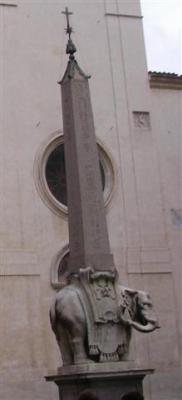Continued from yesterday”¦ When it looked like the rain had slowed down, we ventured out and caught the bus. It turns out we caught the right bus, but going the wrong direction. Oops. We decided to ride it out, knowing that sooner or later it would get us to the Castel. This was not a good of an idea as we originally thought, since it took us way out of downtown. At least we were warm, out of the rain and got to see more of the city than we could on foot. Rome has a lot of nice looking churches, buildings, and sculptures all over the city. After an hour, the bus turned around. Hmmm”¦ it would be at least an hour back to the Castel. We saw Continue reading
Category Archives: History
The Pantheon and The Vittoriano
This morning it was bitter cold, overcast, and windy, with on and off rain. We debated going into Rome, kind of afraid to leave Kosmos in the heavy wind. We decided we were being paranoid, though, and went.
The first thing on today’s list of sites to see was the Pantheon. We exited the Colosseum Metro station to see our connecting bus leaving. Darn. It was really cold and had started raining again, so we took shelter in a nearby café for some hot food and beverages to warm us up. After lunch, we caught a bus that dropped us a few blocks away from the Pantheon. Fortunately, we didn’t have to stand in the rain long.
On the walk over, we passed a statue of an obelisk strapped to the back of an elephant, quite similar to the one that we had seen in Catania. We are pretty sure that the obelisk in Catania isn’t a real Egyptian artifact. It just didn’t have that real Egyptian look to it. However, in passing by this statue, it was immediately evident to us that the obelisk had been pilfered from Thebes (Luxor), Egypt. It is made of the marble that is dominant in most of the temples in Thebes we saw, and it is inscribed with hieroglyphics, looking incredibly similar to the obelisks we had seen in Thebes. We checked Lonely Planet, and, sure enough, it is a real Egyptian obelisk dating from the 6th century BC. The statue was designed by famed sculptor Bernini.

We can’t remember if Continue reading
St. Peter’s Basilica
Continued from yesterday… Then we hopped on the subway and went back to the Vatican, this time to see St. Peter’s Basilica. As we walked around the Vatican walls towards St. Peter’s, we noticed a white line painted in the street paralleling the walls. We think that is the border. We passed by the entrance into Vatican City, guarded by two real Swiss guards. Their uniforms are Continue reading
The Roman and Imperial Forums
Continued from yesterday”¦ The land the Roman Forums are built on had originally been a swamp between the Palantine and Capitoline hills. It was decided that Rome’s city center needed a more central location, so they built a series of canals that drained the swamp. The original Forum really was the city center — a shopping mall, civic center and religious complex. By 46 BC, the original Forum was Continue reading
The Colosseum and The Palantine
Yesterday we decided we needed a complete and total day of rest, a true Sabbath where you do absolutely nothing at all. It was what the doctor ordered. We awoke today feeling less tired and zombiesque and more like ourselves, though we didn’t feel totally back to normal, either.
This morning we took the train back into Rome. We went to the Colosseum first, a noticeably shorter subway ride than the Vatican. As you exit the “Colosseum” station, you are literally across the famous structure. We weren’t expecting it to be so close and we gaped in awe at it. Of course, we were immediately pegged as tourists and recruited to join a tour. The Colosseum, Palantine, and Roman Forums are all side by side and a guided tour of all three was only $17.00 USD each. They even gave us headsets so we could hear the tour guide. It was cheaper than getting the audio guide to all three places, so we joined the tour.
The Colosseum tour was excellent. The guide did a good job. From the outside, the Colosseum looks exactly like the photos you have all seen. The theater was a Greek invention (semicircle around a stage) but the amphitheater (sticking two theaters together) was a Roman invention. The Colosseum held 50,000 70,000 people (depending on which source you site), but, believe it or not, was not the largest stadium built in their day. No one made another amphitheater as large as the Colosseum until the twentieth century.
The Colosseum was built by the Emperor Vespain to “please the people”, meaning to provide entertainment to distract people from their dreary lives. It was inaugurated in Continue reading
